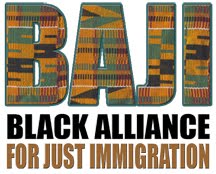Post by Gerald Lenoir, BAJI Executive Director
Isabelle Wilkerson’s best-selling book, “The Warmth of Other Suns: The Epic Story of America’s Great Migration” is a remarkable chronicle of the historical and inspirational movement of millions of African Americans over many decades. Reading it reconnected me to my own family’s migration story and reminded me of the parallels between The Great African American Migration from the U.S. South and the current immigration of peoples from the Global South.
The migration story of my grandmother, Augustine (Tina) Green, began when she boarded a train in New Orleans in 1945. She got off the train in East L.A. and sent for here nine children, a few at a time as she could afford to. Six days a week, she took the long cross-town bus ride from East L.A. to West L.A. to work in a white family’s home to cook, clean and raise their children.
Mama Tina left the South for the same reasons that Ida Mae Gladney, George Starling and Robert Pershing, the migrants in Wilkerson’s saga, left—to escape the legal and extralegal oppression and terror and in search of a better economic future. While she and her children found a better life in L.A., there were still subjected to racism and de facto forms of racial segregation prevalent in their new home. My mother, the oldest of the nine kids, and her siblings grew up in South Central L.A. and faced white vigilante youth gangs and racist police officers as well as discrimination in housing, employment, education and in every sphere of their lives. Wilkerson describes how the individual decisions made by black families like mine created a mass human flow that produced a sea change in the culture, sociology and politics of the nation.
Throughout the book, Wilkerson consistently draws out the parallels between the migration experience of African Americans and the immigration of migrants from Mexico, Haiti, the Philippines, the Democratic Republic of the Congo and many other countries of the Global South with histories of European colonialism and neocolonialism. Many of them have left their home countries to escape grinding poverty and/or civil strife. And in many cases, the U.S. government and U.S. corporations are implicated in their forced migration.
In the case of Mexico, the U.S. Congress ratified the North American Free Trade Agreement (NAFTA) in 1994. U.S. agribusiness corporations then began to flood the Mexican market with cheap agricultural products, undercutting Mexican farmers and forcing over 6 million people to abandon the land and make the dangerous trek across the desert to the U.S.
In the case of Haiti, the U.S. government supported dictator after dictator who made it safe for U.S. corporate investments and twice collaborated to overthrow Haiti’s first democratically elected president, Jean Bertrand Aristide. Desperate Haitians have time and time again risked their lives in rickety, overcrowded boats on the high seas to get to the U.S. to escape political repression and economic deprivation.
So U.S. firms legally cross borders, exploit workers and markets, and bring profits and products back across the border to the U.S. But when people cross borders without papers because of economic hardships and for their own safety, they are labeled as “illegals” and “criminals.” In many ways, they are being treated the same way that African Americans who came from the South were treated when white workers complained that “they’re taking our jobs.”
Like The Great African American Migration, immigration is altering our nation—our culture, our neighborhoods, our political landscape. As a result, we are witnessing a resurgence in white supremacist ideology and organizing that threatens the lives and livelihood immigrants of color. What gets very little discussion is how the rise of racism against immigrants also threatens African Americans.
We need only to look at what is happening in Arizona. The infamous SB1070 law, ostensibly directed toward Latino immigrants, legitimizes and legalizes racial profiling, a practice that has historically been directed towards African Americans. In addition, anti-immigrant activists and lawmakers have been successful in enacting Arizona laws that make it illegal to teach ethnic studies in the public schools and ban affirmative action. Now anti-immigrant racial profiling laws have been passed in Georgia, Alabama and South Carolina—deep in the heart of Dixie.
And states across the country are passing laws mandating that voters have government-issued identification in order to vote because of the unsubstantiated “threat” of non-citizens voting in U.S. elections. Researchers tell us that these laws can potentially disenfranchise over a million African Americans who do not have ID and cannot prove where they were born. All of these Jim Crow/Juan Crow laws impact all people of color, including African Americans, and threaten to severely erode the gains of the Civil Rights and Black Power Movements.
“The Warmth of Other Suns” serves to enlighten and remind African Americans of our migration history and our escape from the maliciousness of Southern-style racial oppression and economic exploitation. It also makes it clear to both African Americans and immigrants that our migration stories are two sides of the same coin. And our struggles against racism and economic inequality are inextricably linked.





